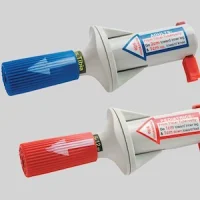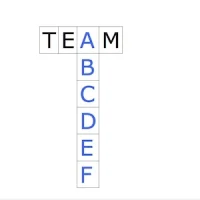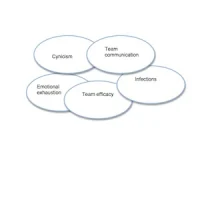Teamwork education is known to improve trauma team performance, including leadership, situation monitoring, communication and prioritisation. High-functioning teams with excellent leadership have higher quality CPR, shorter pre-defibrillation pauses, and shorter times to first defibrillation. The American Heart Foundation and European Resuscitation Council recommend that teamwork and leadership training is included in advanced life support (ALS) and paediatric life support training programmes.
A study from Australia, published in Resuscitation, tested the validity, feasibility and reliability of the Team Emergency Assessment Measure™ (TEAM) in a real clinical setting following testing in simulated settings. TEAM, which was developed at Monash University by Associate Professor Simon Cooper and colleagues, is a 12-item assessment measure used to rate 11 items - on leadership (2 items), teamwork (7 items, including situational awareness, cooperation and coordination, team climate and adaptability), and task management (2 items) using a 5 point Likert scale (‘0’ (Never/hardly ever) to ‘4’ (Always/nearly always)). The tool was developed to assess resuscitation teamwork, but can be used in emergency medicine settings.
See Also: Study: Crew Resource Management Training in Simulation
In this study the team that developed the tool tested TEAM for feasibility, validity and reliability, in two Australian Emergency Departments (ED). Senior nursing staff observed and rated 106 adult resuscitation team events over 10 months where three or more resuscitation team members attended.
Results
Most events rated by the observers immediately after the event were full cardiac resuscitation (43%) with between 3 and 15 team members present for an average of 45 min. The TEAM was found to be feasible and quickly completed in less than a minute with minimal or no training. Non-technical skills overall were good. However, leadership was rated lower than task and teamwork performance, which suggested a need for leadership training. A significant negative correlation was found between the number of staff involved and the TEAM score - the bigger the team the less effective the teamwork.
The authors conclude that the TEAM tool is straightforward and quick to complete and recommend its use in the training and debriefing of medical emergency teams to enhance non-technical skills.
Another study in the same issue of Resucitation validated the French version of the TEAM tool (Maignan et al. 2016). Maxime Maignan, from the University Grenoble Alps – Emergency Department and Mobile Intensive Care Unit in France, and colleagues, analysed use of the tool by 10 medical teams perfoming a standardised cardiac arrest simulation scenario. Their results showed that internal consistency and inter-rater reliability of the French TEAM score are consistent with those reported in the original validation studies. They suggest that further research is conducted to relate the TEAM score with clinical efficacy during resuscitation.
Further information
The TEAM tool and users’guide are available from http://medicalemergencyteam.com
Image credit: Pixabay
A study from Australia, published in Resuscitation, tested the validity, feasibility and reliability of the Team Emergency Assessment Measure™ (TEAM) in a real clinical setting following testing in simulated settings. TEAM, which was developed at Monash University by Associate Professor Simon Cooper and colleagues, is a 12-item assessment measure used to rate 11 items - on leadership (2 items), teamwork (7 items, including situational awareness, cooperation and coordination, team climate and adaptability), and task management (2 items) using a 5 point Likert scale (‘0’ (Never/hardly ever) to ‘4’ (Always/nearly always)). The tool was developed to assess resuscitation teamwork, but can be used in emergency medicine settings.
See Also: Study: Crew Resource Management Training in Simulation
In this study the team that developed the tool tested TEAM for feasibility, validity and reliability, in two Australian Emergency Departments (ED). Senior nursing staff observed and rated 106 adult resuscitation team events over 10 months where three or more resuscitation team members attended.
Results
Most events rated by the observers immediately after the event were full cardiac resuscitation (43%) with between 3 and 15 team members present for an average of 45 min. The TEAM was found to be feasible and quickly completed in less than a minute with minimal or no training. Non-technical skills overall were good. However, leadership was rated lower than task and teamwork performance, which suggested a need for leadership training. A significant negative correlation was found between the number of staff involved and the TEAM score - the bigger the team the less effective the teamwork.
The authors conclude that the TEAM tool is straightforward and quick to complete and recommend its use in the training and debriefing of medical emergency teams to enhance non-technical skills.
Another study in the same issue of Resucitation validated the French version of the TEAM tool (Maignan et al. 2016). Maxime Maignan, from the University Grenoble Alps – Emergency Department and Mobile Intensive Care Unit in France, and colleagues, analysed use of the tool by 10 medical teams perfoming a standardised cardiac arrest simulation scenario. Their results showed that internal consistency and inter-rater reliability of the French TEAM score are consistent with those reported in the original validation studies. They suggest that further research is conducted to relate the TEAM score with clinical efficacy during resuscitation.
Further information
The TEAM tool and users’guide are available from http://medicalemergencyteam.com
Image credit: Pixabay
References:
Cooper S, Cant R, Connell C et al. (2016) Measuring
teamwork performance: Validity testing of the Team Emergency Assessment
Measure (TEAM) with clinical resuscitation teams. Resuscitation, 101: 97-101. doi: 10.1016/j.resuscitation.2016.01.026.
Maignan M, Koch FX, Chaix J et al. (2016) Team Emergency Assessment Measure (TEAM) for the assessment of non-technical skills during resuscitation: Validation of the French version. Resuscitation, 101: 115-20. doi: 10.1016/j.resuscitation.2015.11.024.
Maignan M, Koch FX, Chaix J et al. (2016) Team Emergency Assessment Measure (TEAM) for the assessment of non-technical skills during resuscitation: Validation of the French version. Resuscitation, 101: 115-20. doi: 10.1016/j.resuscitation.2015.11.024.
Latest Articles
Resuscitation, team, emergencies, evaluation
A study from Australia, published in Resuscitation, tested the validity, feasibility and reliability of the Team Emergency Assessment Measure (TEAM) in a real clinical setting following testing in simulated settings.










